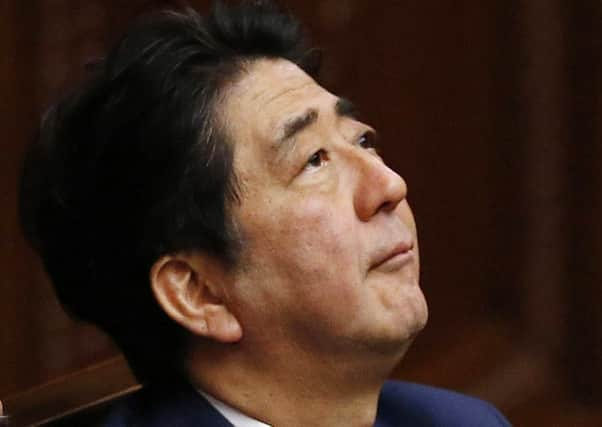Japan give military a bigger role in policy switch


The vote came one day after prime minster Shinzo Abe’s ruling bloc forced the bills through a committee despite protests inside and outside parliament.
Yesterday, hundreds of protesters outside the building chanted anti-war and anti-Abe slogans during the debate and vote, some holding banners reading, “No to war legislation.”
Advertisement
Hide AdAdvertisement
Hide AdMr Abe has long wanted to remove restrictions on Japan’s military in the US-drafted post-Second World War constitution. He said the military’s role should be strengthened to counter China’s growing presence in the region, contribute to international peacekeeping, and prepare for new types of threats such as terrorist attacks.
“The legislation is absolutely necessary in order to protect the lives of the Japanese people and prevent the risk of war,” Mr Abe said after the vote. “The security environment surrounding Japan is becoming increasingly harsh.”
Opponents said the legislation brings greater risks to Japan and violates the constitution, which renounces war “as a sovereign right of the nation and the threat or use of force as means of settling international disputes”.
Opposition politicians walked out after their party leaders delivered speeches against the bills. Mr Abe’s ruling Liberal Democratic Party and its partner Komei party easily passed the legislation despite the boycott since they control two-thirds of the 475 seats in the lower house.
The legislation allows the military, called the Self-Defence Forces, to defend the US and other countries if they come under attack, even if Japan is not.
Opponents say the conditions for involvement are overly vague, giving future governments too much leeway to interpret them as they see fit. They also criticise the forced vote by the ruling bloc as tyranny by the majority.
Polls show about 80 per cent of Japanese oppose the bills and the majority believe the legislation is unconstitutional.
Mr Abe has wanted to revise the charter but lacks public support to do so, and instead has reinterpreted the war-renouncing article and crafted the legislation to fit the reinterpretation.
Advertisement
Hide AdAdvertisement
Hide AdHe acknowledged yesterday that the legislation was unpopular and said his party will make an all-out effort to explain it “to help deepen understanding of the people.”
The vote was also monitored closely outside Japan.
In Beijing, a foreign ministry spokeswoman cautioned against interfering with China’s territorial and security interests.
She added: “It is fully justified to ask if Japan is going to give up its exclusively defence-oriented policy or change the path of peaceful development that has been long pursued after the Second World War.”